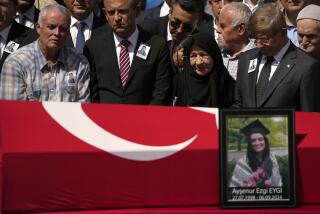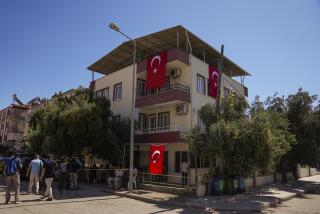Car Bomb Kills Turkish Foe of Extremists
ISTANBUL, Turkey — A car bomb killed one of Turkey’s best-known newspaper columnists Sunday, plunging the country into shock at the death of a tireless campaigner against Islamic extremism and anything else he believed was damaging this 70-year-old secular republic.
Several Islamic groups claimed responsibility for the murder of Ugur Mumcu, 50, who died instantly when a bomb that had been planted under his car exploded as he started the automobile outside his apartment in Ankara, Turkey’s capital.
Turkey’s state television news hinted at what many openly suspect: that responsibility for the killing may be linked to Iran’s Islamic revolutionary radicals, despite a recent improvement in official relations between Ankara and Tehran.
“Fighting desperately for their dark hopes in (first President Kemal) Ataturk’s enlightened Turkey, forces controlled from outside chose Ugur Mumcu,” said an announcer.
Mumcu’s left-wing Cumhuriyet newspaper said the most likely suspect group was the Islamic Salvation Organization, whose spokesman called the paper immediately after the blast to say that Mumcu “had been punished.”
“The other groups (claiming responsibility) all said they were ‘Islamic.’ I suppose we can say that what happened was an attack on secularism,” said Ozgen Acar, a Cumhuriyet editor.
The group’s name has been used at least once before in claims of responsibility after murders of four other Turkish writers or academics in the forefront of the fight to keep a firmly secular government for NATO-member Turkey’s 60 million Muslims.
Those killings appeared to stop two years ago. Mumcu did become the 13th journalist to be killed in the past 12 months in Turkey, but the others were mostly murdered in southeastern Turkey while reporting on the fight between Kurdish guerrillas and Turkish security forces.
Mumcu was working on a book about links between Kurdish separatists and the Turkish national intelligence agency. His colleagues said that he had made many enemies with his no-holds-barred reporting.
As a journalist, he was well known for publicizing the Bulgarian link in the attempted assassination in 1981 of Pope John Paul II by a Turk, Mehmet Ali Agca. In controversial, meticulously researched articles and at least 13 books, he constantly campaigned against Kurdish extremism, drug Mafias, official corruption, the activities of foreign spy agencies, Turkey’s relationship with the North Atlantic Treaty Organization and Turkish police methods.
More to Read
Sign up for Essential California
The most important California stories and recommendations in your inbox every morning.
You may occasionally receive promotional content from the Los Angeles Times.










